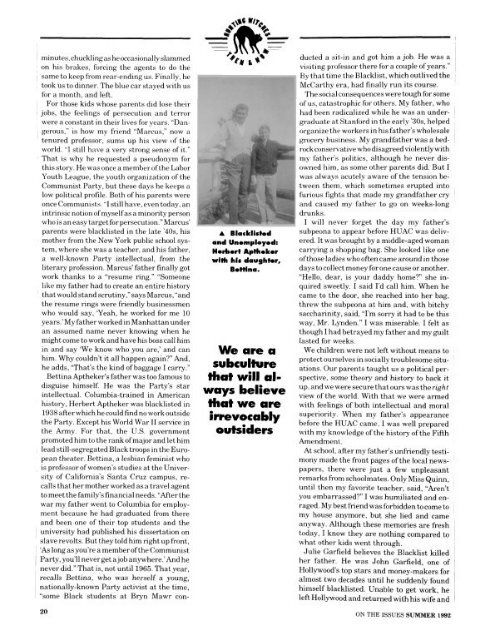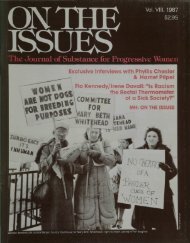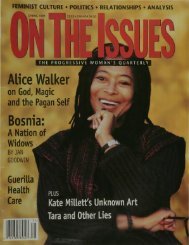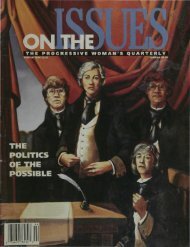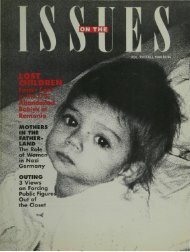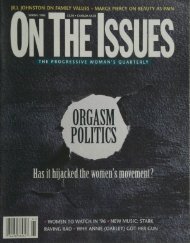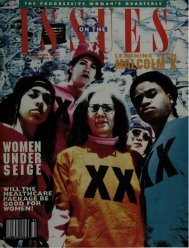300 Years & Counting 1H KILLS - On The Issues Magazine
300 Years & Counting 1H KILLS - On The Issues Magazine
300 Years & Counting 1H KILLS - On The Issues Magazine
Create successful ePaper yourself
Turn your PDF publications into a flip-book with our unique Google optimized e-Paper software.
minutes, chuckling as he occasionally slammedon his brakes, forcing the agents to do thesame to keep from rear-ending us. Finally, hetook us to dinner. <strong>The</strong> blue car stayed with usfor a month, and left.For those kids whose parents did lose theirjobs, the feelings of persecution and terrorwere a constant in their lives for years. "Dangerous,"is how my friend "Marcus," now atenured professor, sums up his view of theworld. "I still have a very strong sense of it."That is why he requested a pseudonym forthis story. He was once a member of the LaborYouth League, the youth organization of theCommunist Party, but these days he keeps alow political profile. Both of his parents wereonce Communists. "I still have, even today, anintrinsic notion of myself as a minority personwho is an easy target for persecution." Marcus'parents were blacklisted in the late '40s, hismother from the New York public school system,where she was a teacher, and his father,a well-known Party intellectual, from theliterary profession. Marcus' father finally gotwork thanks to a "resume ring." "Someonelike my father had to create an entire historythat would stand scrutiny," says Marcus, "andthe resume rings were friendly businessmenwho would say, "Yeah, he worked for me 10years.' My father worked in Manhattan underan assumed name never knowing when hemight come to work and have his boss call himin and say 'We know who you are,' and canhim. Why couldn't it all happen again?" And,he adds, "That's the kind of baggage I carry."Bettina Aptheker's father was too famous todisguise himself. He was the Party's starintellectual. Columbia-trained in Americanhistory, Herbert Aptheker was blacklisted in1938 after which he could find no work outsidethe Party. Except his World War II service inthe Army. For that, the U.S. governmentpromoted him to the rank of major and let himlead still-segregated Black troops in the Europeantheater. Bettina, a lesbian feminist whois professor of women's studies at the Universityof California's Santa Cruz campus, recallsthat her mother worked as a travel agentto meet the family's financial needs. "After thewar my father went to Columbia for employmentbecause he had graduated from thereand been one of their top students and theuniversity had published his dissertation onslave revolts. But they told him right up front,'As long as you're a member of the CommunistParty, you'll never get a job anywhere.' And henever did." That is, not until 1965. That year,recalls Bettina, who was herself a young,nationally-known Party activist at the time,"some Black students at Bryn Mawr con-20• Blacklistedand Unemployed:Herbert Apthekerwith his daughter,Bettina.We are asubculturethat will alwaysbelievethat we areirrevocablyoutsidersducted a sit-in and got him a job. He was avisiting professor there for a couple of years."By that time the Blacklist, which outlived theMcCarthy era, had finally run its course.<strong>The</strong> social consequences were tough for someof us, catastrophic for others. My father, whohad been radicalized while he was an undergraduateat Stanford in the early '30s, helpedorganize the workers in his father's wholesalegrocery business. My grandfather was a bedrockconservative who disagreed violently withmy father's politics, although he never disownedhim, as some other parents did. But Iwas always acutely aware of the tension betweenthem, which sometimes erupted intofurious fights that made my grandfather cryand caused my father to go on weeks-longdrunks.I will never forget the day my father'ssubpeona to appear before HUAC was delivered.It was brought by a middle-aged womancarrying a shopping bag. She looked like oneof those ladies who often came around in thosedays to collect money for one cause or another."Hello, dear, is your daddy home?" she inquiredsweetly. I said I'd call him. When hecame to the door, she reached into her bag,threw the subpeona at him and, with bitchysaccharinity, said, "I'm sorry it had to be thisway, Mr. Lynden." I was miserable. I felt asthough I had betrayed my father and my guiltlasted for weeks.We children were not left without means toprotect ourselves in socially troublesome situations.Our parents taught us a political perspective,some theory and history to back itup, and we were secure that ours was the rightview of the world. With that we were armedwith feelings of both intellectual and moralsuperiority. When my father's appearancebefore the HUAC came, I was well preparedwith my knowledge of the history of the FifthAmendment.At school, after my father's unfriendly testimonymade the front pages of the local newspapers,there were just a few unpleasantremarks from schoolmates. <strong>On</strong>ly Miss Quinn,until then my favorite teacher, said, "Aren'tyou embarrassed?" I was humiliated and enraged.My best friend was forbidden to come tomy house anymore, but she lied and cameanyway. Although these memories are freshtoday, I know they are nothing compared towhat other kids went through.Julie Garfield believes the Blacklist killedher father. He was John Garfield, one ofHollywood's top stars and money-makers foralmost two decades until he suddenly foundhimself blacklisted. Unable to get work, heleft Hollywood and returned with his wife andON THE ISSUES SUMMER 1992


